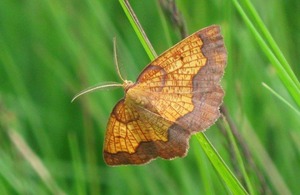
The dark bordered beauty moth, one of England's rarest species, is now found in only one known location: a military training area near York. This small yet striking
moth is at risk of extinction, and efforts are being made to save it.
The Ministry of Defence (MoD), which owns much of the moth’s habitat at Strensall Common, a 570-hectare expanse of open heathland designated as a Site of Special Scientific Interest, is collaborating with partners to protect the species. Despite the area being used for essential military training, the MoD is committed to preserving the moth’s environment.
Strensall Common, located east of the North Yorkshire village of Strensall in the Vale of York, has seen a dramatic decline in the dark bordered beauty moth population, with numbers dropping by over 90% since records began. It is estimated that only 50 to 100 of these moths remain at the site, where their presence has been documented since 1894.
The moth thrives in sheltered areas at the edges of woodlands, where creeping willow, its only food source, grows. However, creeping willow habitats are under threat from factors such as wildfires and sheep grazing, leading to a significant decrease in the moth’s population since systematic monitoring began in 2007.
Grazing by cattle and sheep is essential for maintaining the lowland heath habitats of Strensall Common, preventing the encroachment of trees and shrubs. However, this grazing has also led to the loss of creeping willow, reducing suitable feeding sites for moth caterpillars and limiting areas for moths to lay eggs in the summer.
To combat this decline and save the moth from extinction in England, the Defence Infrastructure Organisation (DIO) has provided funding and materials through its Conservation Stewardship Fund. These resources have been used to create fenced enclosures around areas of low-growing creeping willow within the training area. Additional funding has been provided by Yorventure, an independent not-for-profit initiative that supports community and environmental projects in the City of York and North Yorkshire.
These combined efforts aim to protect and restore the dark bordered beauty moth’s habitat, giving it a chance to recover and thrive once again in its last remaining stronghold in England.
Defence Minister Luke Pollard said:
“The first duty of any government is protecting our citizens, and I commend these conservation efforts to protect the wildlife that call our estate home and have no impact on our essential training activity.
It’s brilliant to see the work we’re doing with partners to safeguard the survival of this wonderful moth while conducting training at the same site to keep Britain secure”.




































